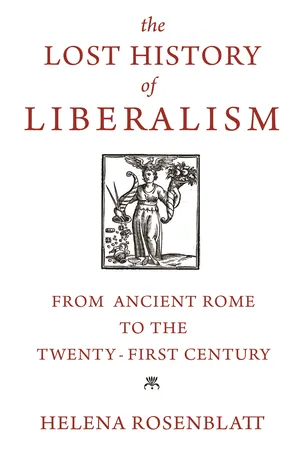
The Lost History of Liberalism
From Ancient Rome to the Twenty-First Century
- English
- PDF
- Available on iOS & Android
About This Book
The changing face of the liberal creed from the ancient world to today The Lost History of Liberalism challenges our most basic assumptions about a political creed that has become a rallying cry—and a term of derision—in today's increasingly divided public square. Taking readers from ancient Rome to today, Helena Rosenblatt traces the evolution of the words "liberal" and "liberalism, " revealing the heated debates that have taken place over their meaning.In this timely and provocative book, Rosenblatt debunks the popular myth of liberalism as a uniquely Anglo-American tradition centered on individual rights. She shows that it was the French Revolution that gave birth to liberalism and Germans who transformed it. Only in the mid-twentieth century did the concept become widely known in the United States—and then, as now, its meaning was hotly debated. Liberals were originally moralists at heart. They believed in the power of religion to reform society, emphasized the sanctity of the family, and never spoke of rights without speaking of duties. It was only during the Cold War and America's growing world hegemony that liberalism was refashioned into an American ideology focused so strongly on individual freedoms.Today, we still can't seem to agree on liberalism's meaning. In the United States, a "liberal" is someone who advocates big government, while in France, big government is contrary to "liberalism." Political debates become befuddled because of semantic and conceptual confusion. The Lost History of Liberalism sets the record straight on a core tenet of today's political conversation and lays the foundations for a more constructive discussion about the future of liberal democracy.
Frequently asked questions
Information
Table of contents
- Cover
- THE LOST HISTORY OF LIBERALISM
- Title
- Copyright
- Dedication
- CONTENTS
- Acknowledgments
- Introduction
- CHAPTER 1 What It Meant to Be Liberal from Cicero to Lafayette
- CHAPTER 2 The French Revolution and the Origins of Liberalism, 1789–1830
- CHAPTER 3 Liberalism, Democracy, and the Emergence of the Social Question, 1830–48
- CHAPTER 4 The Question of Character
- CHAPTER 5 Caesarism and Liberal Democracy: Napoleon III, Lincoln, Gladstone, and Bismarck
- CHAPTER 6 The Battle to Secularize Education
- CHAPTER 7 Two Liberalisms: Old and New
- CHAPTER 8 Liberalism Becomes the American Creed
- Notes
- Selected Bibliography
- Index